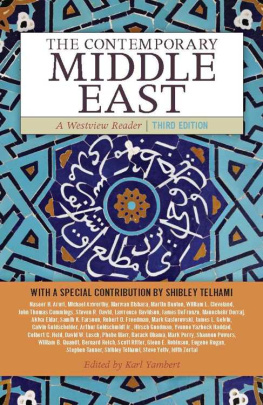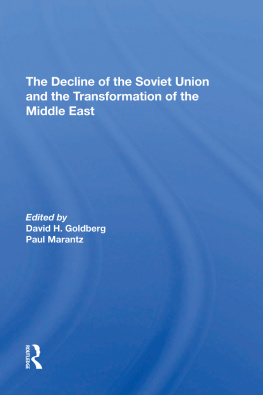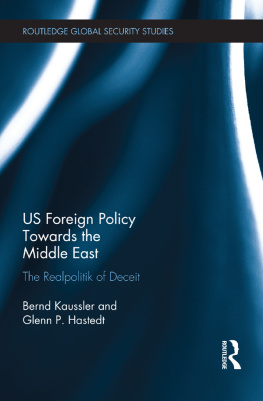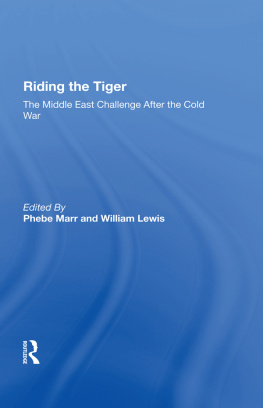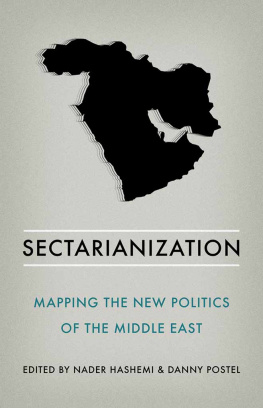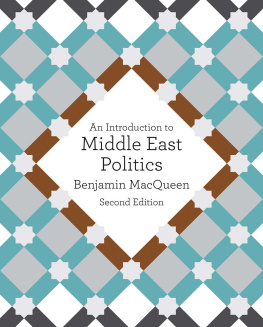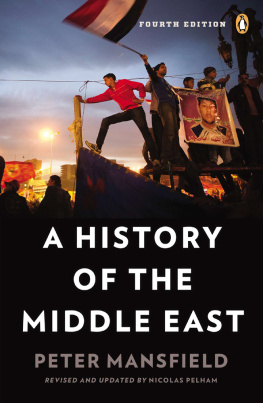THE CONTEMPORARY
MIDDLE EAST
THE CONTEMPORARY
MIDDLE EAST
A WESTVIEW READER

THIRD EDITION
WITH A SPECIAL CONTRIBUTION BY
Shibley Telhami
EDITED BY
Karl Yambert

For Hallie
Westview Press was founded in 1975 in Boulder, Colorado, by notable publisher and intellectual Fred Praeger. Westview Press continues to publish scholarly titles and high-quality undergraduate- and graduate-level textbooks in core social science disciplines. With books developed, written, and edited with the needs of serious nonfiction readers, professors, and students in mind, Westview Press honors its long history of publishing books that matter.
Copyright 2013 by Westview Press
Published by Westview Press,
A Member of the Perseus Books Group
All rights reserved. Printed in the United States of America. No part of this book may be reproduced in any manner whatsoever without written permission except in the case of brief quotations embodied in critical articles and reviews. For information, address Westview Press, 2465 Central Avenue, Boulder, CO 80301.
Find us on the World Wide Web at www.westviewpress.com.
Every effort has been made to secure required permissions for all text, images, maps, and other art reprinted in this volume.
All previously published chapters reprinted by permission of the Perseus Books Group.
Westview Press books are available at special discounts for bulk purchases in the United States by corporations, institutions, and other organizations. For more information, please contact the Special Markets Department at the Perseus Books Group, 2300 Chestnut Street, Suite 200, Philadelphia, PA 19103, or call (800) 810-4145, ext. 5000, or e-mail .
Designed by Jeff Williams
Library of Congress Cataloging-in-Publication Data
The contemporary Middle East : a Westview reader / edited by Karl Yambert ; with a special contribution by Shibley Telhami.3rd ed.
p. cm.
Includes bibliographical references and index.
ISBN 978-0-8133-4840-7 (e-book)
1. Middle East. I. Yambert, Karl.
DS44.C575 2012
956.05dc23
2012033625
10 9 8 7 6 5 4 3 2 1
CONTENTS

Colbert C. Held and John Thomas Cummings
Within its regional unity, the Middle East possesses great cultural diversity. Differences of language, religion, and ethnicity create a complex mosaic of peoples.
Arthur Goldschmidt Jr. and Lawrence Davidson
Varieties of Arab nationalism all share a consistent distrust of the West, based on bitter historical experience.
Yvonne Yazbeck Haddad
Islamism is a worldview in which the US support for Israel in particular is understood to be part of a larger Western effort to keep Muslim states weak and subservient.
Steve Yetiv
Access to Middle East oil will become even more critical as oil supplies dwindle, even as the regions flow of oil is vulnerable to several sources of major disruption.
William B. Quandt
The Bush administrations ambitious plan to remake the Middle East fell short and left the United States facing many obstacles in pursuit of its goals in the region.
Barack Obama
President Obama seeks a new beginning by addressing sources of tension between the United States and the Muslims of the world.
Robert O. Freedman
Israel has battled Arab states since its founding and now faces a threat beyond the Arab world in Iran, which backs Hezbollah and Hamas, two militant enemies of Israel.
Bernard Reich and Shannon Powers
Broad support of Israel by the United States is accompanied by disagreements on many specifics of the Arab-Israeli conflict.
Glenn E. Robinson
Contradictory promises to Jews and Palestinian Arabs set the stage for inevitable conflict following the 1948 establishment of Israel.
Idith Zertal and Akiva Eldar
Ariel Sharons security fence, new settlements, and unilateral withdrawal from Gaza were designed to deepen Israels hold on the West Bank.
Samih K. Farsoun and Naseer H. Aruri
The millions of Palestinian refugees and their right to return are not always represented by those Palestinians in Israel and the occupied territories.
Calvin Goldscheider
Israels pluralistic society is shaped by Jewish communities outside the State of Israel as well as by Palestinians within territories administered by Israel.
Hirsch Goodman
Syrias threat to Israel consists chiefly in its serving as a conduit for Iranian aid to Hamas and Hezbollah.
Steven R. David
Even given scenarios in which Iran might launch a nuclear attack against Israel, or Israel might preemptively strike Iranian facilities, Israel will likely allow Iran to become a nuclear state.
Stephen Tanner
Americas battle against the perpetrators of 9/11, Osama bin Laden and al-Qaeda in Afghanistan, was derailed by turning attention to Saddam Hussein and Iraq.
Phebe Marr
Iraq must contend with the separatist tendencies of Shiite Arabs and Sunni Kurds, who were ruled until recently by a Sunni Arab minority.
James DeFronzo
The Iraq War damaged US moral standing internationally, strengthened Hamas and Hezbollah, and established a Shiite-dominated Iraqi government friendly to Iran.
William L. Cleveland and Martin Bunton
In the aftermath of the Iraq War, the policies of Barack Obama toward Iraq and Iran have been surprisingly similar to the policies of George W. Bush.
Phebe Marr
Shiite prime minister Nouri al-Maliki shored up his position by steering a secular, nationalist course rather than a sectarian one, and by negotiating Americas exit from Iraq.
David W. Lesch
The Iranian Revolution of 1979 established a Shiite theocracy next door to Saddam Hussein, prompting him to invade Iran and begin the eight-year-long Iran-Iraq War.
Mark Gasiorowski
Irans political culture contains an undercurrent of distrust of foreigners even as Iranian moderates in particular occasionally reach out to the West.
Manochehr Dorraj
The US rebuff of Iran as a member of the axis of evil contributed to Irans strengthened ties with Russia, China, Syria, Hamas, and Hezbollah.
Scott Ritter
The Israeli lobby influences US foreign policy to regard Iran as a regional threat, but the United States would do better to normalize relations with Iran.
Michael Axworthy
The United States rejected Irans 2003 Grand Bargain that would have committed Iran to a two-state solution with Israel and to a peaceful nuclear program.
Marwan Bishara
The Muslim Brotherhoods history of charitable work translates into strong party organization in post-Mubarak Egypt, even as traditionalists and radicals disagree over the Brotherhoods course.
Mark Perry
Terrorist groups that participate in elections and governments and that have constituencies to answer to, such as Hamas in Gaza and Hezbollah in Lebanon, can be negotiated with.
Eugene Rogan
The trajectories of the Arab Spring are followed in Tunisia, Egypt, Libya, and Yemen, where longtime rulers were ousted, and in Bahrain and Syria, whose regimes remain in power.

